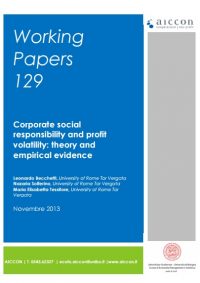129 – Corporate social responsibility and profit volatility: theory and empirical evidence
Abstract
Corporate social responsibility implies extra care for the wellbeing of stakeholders different from shareholders. In our theoretical model we show that, when this principle implies that more CSR oriented companies incorporate stakeholders’ wellbeing constraints, it translates into higher sensitivity of profits to economic shocks. Our empirical analysis finds support for this hypothesis showing that CSR attributes which relate to positive contributions to stakeholders’ wellbeing significantly and positively affects idiosyncratic profit volatility.
Keywords:
corporate social responsibility, stock price volatility.
JEL numbers: M14; D92; D53; E22; G32 .

